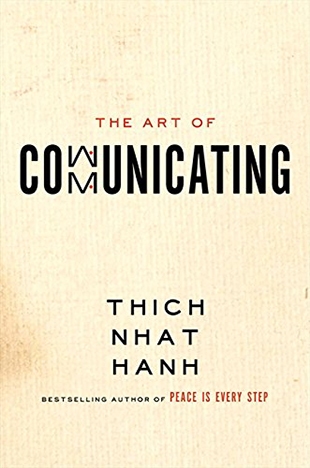"When a difficulty arises in our relationships and one of us feels resentment or hurt, a good practice to try is called 'beginning anew.' To begin anew is to look deeply and honestly at ourselves — our past actions, speech, and thoughts — and to create a fresh beginning within ourselves and in our relationships with others.
"Beginning anew helps us develop our kind speech and compassionate listening because it is a practice of recognition and appreciation of the positive elements of another person. Recognizing others' positive traits allows us to also see our own good qualities. Along with these good traits, we each have areas of weakness, such as talking out of our anger or being caught in our misperceptions. As in a garden, when we 'water the flowers' of loving kindness and compassion in each other, we also take energy away from the weeds of anger, jealousy, and misperception.
"We can practice beginning anew every day by expressing our appreciation to the people we care about and apologizing right away when we do or say something that hurts them. We can also politely let others know when we have been hurt.
"A more formal beginning anew can be done weekly in families and in work situations. It is a three-part process: watering flowers, expressing regrets, and expressing hurts and difficulties. This practice can prevent feelings of hurt from building up over weeks and helps make the situation safe for everyone in the workplace or family.
"Flower watering is the first part of the practice. Flower watering is simply showing appreciation for the others in your family or work community. People do it one at a time, waiting until they feel moved to speak. The others let them speak without response. It is helpful for people to hold a vase of flowers or some object in front of them as they speak, so that their words reflect the freshness and beauty of the flowers. During flower watering, the speaker acknowledges the wholesome, wonderful qualities of the others. It is not flattery; we need to speak the truth. Everyone has strong points that can be seen with awareness. No one can interrupt the person holding the flowers. Each person is allowed as much time as needed, and everyone else practices deep listening. When one person has finished speaking, he or she stands up and slowly returns the vase to the center of the room.
"We should not underestimate the first step of flower watering. When we sincerely recognize the beautiful qualities of other people, it is very difficult to hold on to our feelings of anger and resentment. We naturally soften, and our perspective becomes wider and more inclusive of the whole reality.
"In the second part of the practice, participants express regret for anything they have done to hurt others. It does not take more than one thoughtless phrase to hurt someone. Sometimes we hold on to some small resentment or regret, and it grows because we don't have the time to make it right. The practice of beginning anew is an opportunity for us to recall some regret from earlier in the week and undo it.
"In the third part of the ceremony, we express ways in which others have hurt us. Loving speech is crucial. We want to heal our families and work communities, not harm them. We speak frankly, but we don't want to be destructive. When we sit among people who are all practicing deep listening, our speech becomes more beautiful and more constructive. We never blame or argue.
"In this final part of the practice, compassionate listening is crucial. We listen to another's hurts and difficulties with the willingness to relieve the suffering of the other person, not to judge or argue. We listen with all our attention. Even if we hear something that is not true, we continue to listen deeply so the other person can express his or her pain and release the tensions within. If we reply or correct that person, the practice will not bear fruit. We just listen. If we need to tell others that their perception was not correct, we can do that a few days later, privately and calmly. Then, at the next beginning anew practice, they may rectify the error themselves, and we will not have to say anything. We can end the practice with a moment of silence.
"Just practicing the first part of beginning anew — flower watering — can increase the happiness and communication in your family or your workplace. You don't need to do all three parts each time. Especially when the practice is new to you, it will work to spend most of your time on flower watering. Then slowly over time, as trust is built, you can add the second and third parts. Even then, don't skip over the first. Expressing appreciation is one of the greatest ways of building strong and caring relationships."
